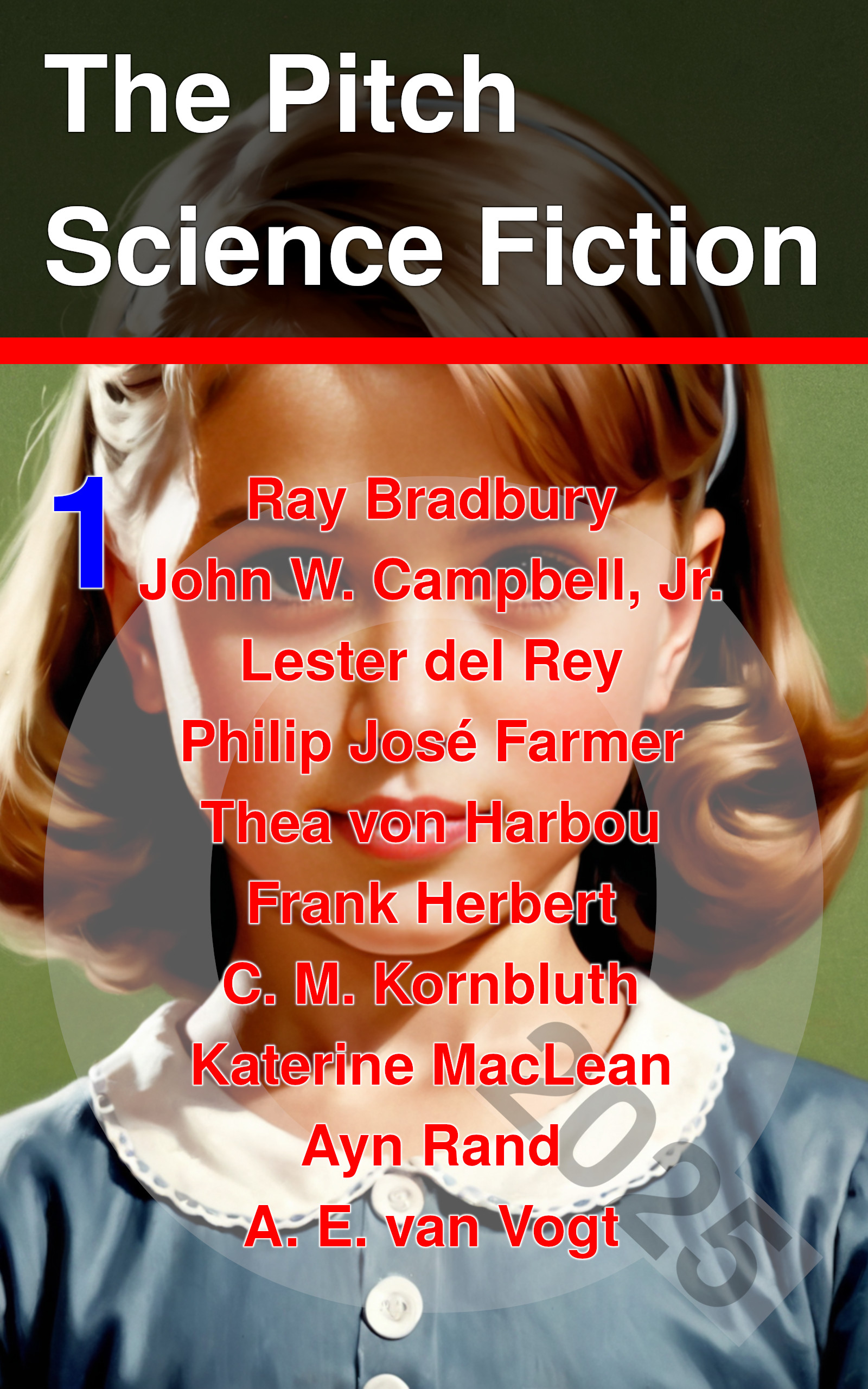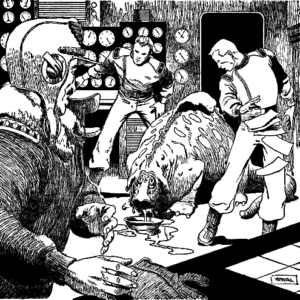The Snowball Effect by Katherine MacLean
President Holloway, a man of budgets and bylaws, found himself staring down a theoretical tempest brewed in the Sociology department by the cantankerous Professor Caswell. Caswell’s “snowball effect,” a math-laced theory of runaway group expansion, landed on their laps like a philosophical hand grenade. Their guinea pig: a mundane sewing circle. Injecting principles of self-interest and recruitment, they watched in mounting horror as the innocuous hobbyists mutated into the Watashaw Mutual – a behemoth corporation with tendrils reaching for societal control. Holloway gripped his mahogany desk, sweat prickling beneath his starched collar. Caswell, eyes gleaming, muttered, “Exponential growth, old boy. Elegant, isn’t it? Terrifyingly so.” MacLean’s prose drips with dark humor as she dissects the fragile dance of human ambition and the unforeseen chaos born from meticulously calculated control. The Snowball Effect isn’t just a story; it’s a warning whispered in silicon and thread.
Missing Link by Frank Herbert
Gienah III dripped emerald and shadow. Lewis Orne, a Terran field agent barely out of his greenhorn phase, shouldered his plasma pistol, the humid air clinging like a shroud. He was hunting ghosts – the missing starship Delphinus Rediscovery and its crew. Instead, he found their legacy writ large in the flesh-and-steel society of the Gienah. Gleaming artefacts from the vanished vessel empowered these jungle-born folk, turning them into something akin to silicon oracles. Their champion, Tanub, brandished a weapon cobbled from human tech – a chilling mosaic of progress and peril.
Orne found himself caught in a spiderweb of interstellar consequence. Above the rustling canopy, Terran Command loomed, its talons itching for intervention. Below, Tanub’s gaze held a world on a knife-edge. Herbert spins a taut narrative where whispers turn into power plays and cultural collisions threaten to erupt. Dialogue crackles with suspicion and guarded hope as Orne bargains for peace, each word a fragile thread in the tapestry of first contact. The ghosts of human hubris echo through the emerald twilight – a stark testament to the unintended archipelagos of consequence sown across the void.
The Marching Morons by C. M. Kornbluth
Honest John Barlow blinked open eyes older than history itself, deposited unceremoniously in a world gone profoundly dim. Centuries spent suspended were prologue to a societal autopsy: human intellect had eroded into near oblivion. The average IQ hovered at a soul-crushing 45. Efim Hawkins, a potter whose calloused hands held onto the remnants of craftsmanship in this crumbling era, was Barlow’s bewildered guide. But Barlow wasn’t here for anthropological study. He saw an opening, a chasm ripe with the stench of manipulable ignorance. Kornbluth paints this tableau with corrosive wit, as Barlow, a relic from a bygone age of thought, engineers a Machiavellian puppet-show to control the masses. The gears of his ambition turn amidst the societal wreckage, each clink a chilling ethical clangour.
Barlow’s rise mirrors the novella’s central dread: the terrifying normalcy of intellectual atrophy. Kornbluth doesn’t shy from unflinching satire, laying bare the insidious dance of overpopulation and cultural stagnation where mediocrity is fetishized and progress choked. The Marching Morons isn’t just a dystopia; it’s a spectral mirror held to our faces, reflecting the chilling contours of uncritical acceptance and its catastrophic fallout.
Anthem by Ayn Rand
Equality 7-2521 lived in a world where souls were shorn of names, lives carved by councils, and thought itself policed. Yet, within the steel-grey conformity of this collectivist dystopia, a spark ignited. Driven by an intellect deemed heretical and a burning curiosity swallowed as sin, he thirsted for truth beyond the sanctioned narratives. Nightfall became his sanctuary, the clandestine script of his soul spilling onto forbidden pages. In whispers against the enforced sameness, Equality confessed the ache of being different, the gnawing void of unexamined truths. His delve into the spectral archives of the “Unmentionable Times” unearthed a relic – a forgotten testament to individualism. It was a revelation, a philosophical bomb in the heart of ideological control. Equality’s shackles shattered, replaced by the raw yearning for self-definition. Rand guides us through his eyes, charting the harrowing terrain of societal oppression and the soul’s defiant blossoming. Anthem is not just a rebellion; it’s a hymn to the indomitable human spirit, forever questing for its own liberated melody against the siren song of enforced oneness.
The Life Watch by Lester del Rey
Norden lived in the ghostlight of oblivion. The Exterminator attack had seared his soul, leaving humanity on the skeletal shore of extinction. He alone remembered their silent ships, the abduction of his colleague a phantom limb forever aching. Rescued to a bunker-tomb, he was humanity’s last oracle, tasked with deciphering the enemy—and himself. Working alongside Pat, whispers of conspiracy coiled around Norden like data streams in a malfunctioning mainframe. Unseen enemies, mirrored lives, and the chilling truth of his own creation bled together. Armed with a weapon born from the bio-signature of life itself, he stood poised on the precipice. But vengeance gnawed at him, a binary echo in the desolate circuitry of his being. In the face of oblivion, Norden grappled: could a ghost fight a god and still hold onto his humanity?
The Wounded by Philip José Farmer
He moved through them like a spectral balm, this man woven from empathy itself. Whispers called him a celestial mechanic, mending broken hearts in a world choked with unseen scars. At a clandestine gathering of souls seeking solace, he beheld her—a bloom of yearning amidst the spectral dusk. Her confession, raw and exposed, pierced his sanctuary. He felt the pull of her plea, mirrored in the echoing chasms of his own unstitched wounds. In tending to hers, he grappled with a truth too potent to ignore: healing himself meant confronting the legion of ghosts he carried. The fractured psyches around them shifted, mirroring the fragile dance playing out between them. Farmer’s tapestry isn’t just of individual mending, but of a society yearning to stitch itself back together, thread by thread, touch by touch. It begs the question: can wholeness be found in the raw exposure of vulnerability, or will the ache of connection forever linger?
The Expendables by A. E. van Vogt
Claustrophobic amidst the metal guts of the _Hope of Man_, generations hurtled toward Alta III, their promised Eden a Pandora’s Box. Captain Browne, a relic of iron-fisted command, cast out John Lesbee and his crew in a lifeboat—a suicide mission cloaked in celestial exploration. But beneath the protocols, Lesbee saw the strings. Manipulated voyages, hidden agendas—the echoes of command reaching even to the telepathic Karn he encountered on this obsidian world. Betrayal coiled tighter than hull girders as Lesbee danced between cosmic leviathans and Earthbound tyranny. A rebellion sparked in his circuits, a flicker of defiance against a crew deemed expendable. In the heart of the void, Van Vogt paints a portrait of survival where loyalty is a loaded weapon and leadership’s true cost bleeds out across the final frontier. On Alta III, the question isn’t just who lives, but whose vision dictates their sacrifice.
Metropolis by Thea von Harbou
In 2026’s Metropolis, steel towers pierce a sky choked with factory smoke. Thea von Harbou paints a world both glittering and grotesquely unequal. Freder, gilded son of the city’s iron fist, stumbles into a chasm when he glimpses the nameless faces toiling in its depths – ghostly echoes haunting his ivory tower. A siren from the underworld ignites a fire in him, shattering his complacency. Plunging from opulence into the city’s visceral core, Freder confronts a mechanized leviathan where flesh and steel clash. Von Harbou’s Metropolis isn’t just a cityscape; it’s a crucible of conscience, fiercely grappling with progress’ bloody toll and the aching humanity trapped beneath its gears. A timeless plea for unity echoes through the clang and hiss of industry, a whisper of hope in the heart of mechanized darkness.
The Voice of the Void by John W. Campbell, Jr.
John W. Campbell’s The Voice of the Void is a hard-won symphony of starlight and steel. Earth’s sun bleeds its life away, dooming humanity to cosmic nightfall. Hal Jus, an astronomer with eyes on the eternal void, uncovers celestial lifelines – worlds orbiting Betelgeuse, flickering beacons in the encroaching darkness. Racing against time and a dying star, he and his crew wrestle with the birth pangs of interstellar travel, their fragile hope menaced by the Atomic Giants – colossal beings of living energy who challenge humanity’s claim on the cosmos. This isn’t just hard sci-fi; it’s the visceral pulse of human will against oblivion. Through breakthroughs and cosmic trials, Campbell paints a breathtaking saga of survival, ingenuity, and the indomitable spirit that propels us beyond the cradle of our dying sun, towards a triumphant dawn on a distant world.
Zero Hour by Ray Bradbury
Ray Bradbury’s chilling short story inhabits the spectral space between childhood games and encroaching nightmare. Young Mink leads a coterie in their elaborate “Invasion,” their whispers of a puppet-master entity named Drill at first dismissed as childish fancies. But the lines blur as their play hardens, commandeering everyday objects with uncanny purpose, cloaked in cryptic pronouncements that prickle Mrs. Morris’s maternal unease. From her perch of mounting dread, she watches, trapped between a yearning for normalcy and the icy tendrils of suspicion coiling around her heart. Escaping to the attic’s sanctuary, she uncovers the horrifying truth: innocence warped, imagination weaponized, and the whispered void given terrifying form. Bradbury’s masterful hand guides us through a slow-burn terror, leaving an indelible stain—a chilling testament to the darkness that can bloom in the fertile ground of unspoken childhood imaginings.
This EPUB3-version has been produced by humans. It contains advanced typesetting (embedded fonts) and graphic elements, including around 50 new and original illustrations. Ten exciting stories, around 160 thousand words.
Bibliographical information is available at <https://www.ester.ee/record=b5745389>.




Reviews
There are no reviews yet.